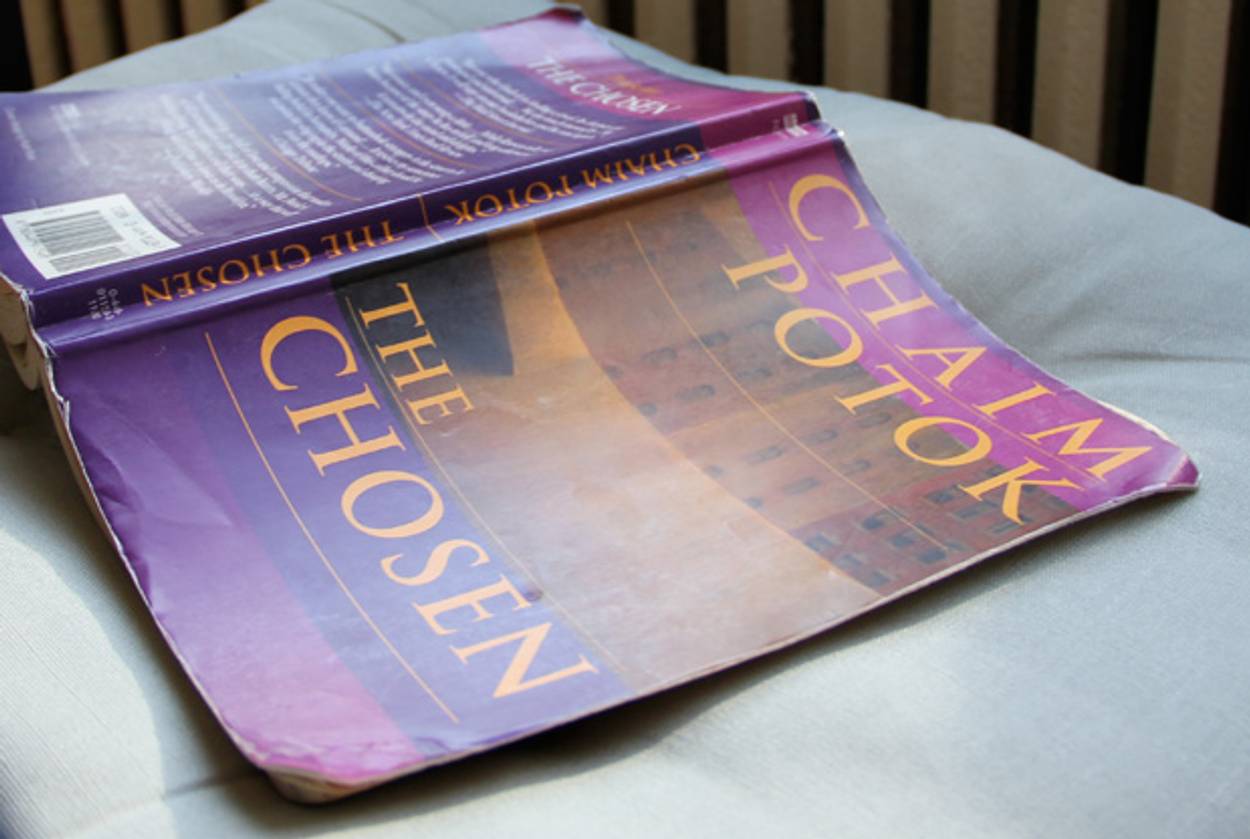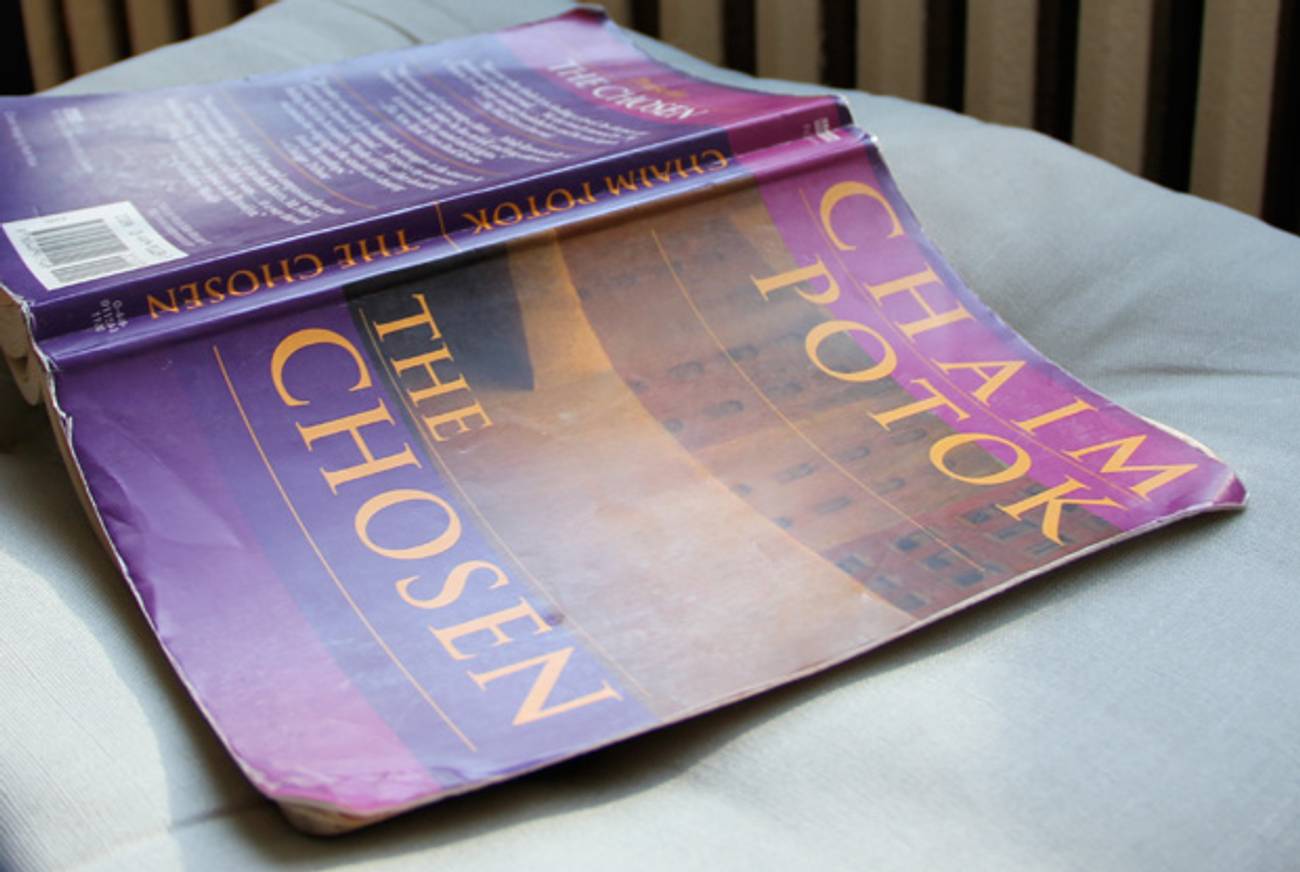Choice
Chaim Potok’s 1967 novel The Chosen, about Jewish teenagers in Brooklyn, is no less inscrutable for adults than it has been for generations of young readers




When I was a younger reader—I’m talking pre-teens through hopeful, unblemished young adulthood—I mostly avoided reading any novels with Jewish characters or themes. Starring Sally J. Freedman as Herself was the only exception I can recall, and that had more to do more with my stubborn fidelity to all things Judy Blume.
To the best of my understanding, this avoidance had nothing to do with self-hatred. I simply figured, Why read what you know? I grew up in a Conservative Jewish home outside of Boston; I went to shul most Shabbats; I attended Jewish day school; I read the Torah and Haftorah at my Bat Mitzvah; I spoke Hebrew. I knew where my family came from—my mother from Peabody, Mass., and my father from Brooklyn, N.Y. I also knew their respective cheers: “Rickety rackety Tannery Town, who can hold Peabody down? Nobody!” my cheerleader mother would shout. For his part, my father taunted uptown rivals thusly: “Chazak v’Amatz: the Bronx should only plotz!” I liked my father’s stories about life in and around King’s Highway and Coney Island in the 1940s and ’50s, but I had no desire to read someone else’s.
Which brings me to The Chosen, Chaim Potok’s 1967 novel of two teenagers in Williamsburg, Brooklyn, who first meet as enemies on the baseball diamond but soon become close friends. I avoided it like the plague, because it was about both boys and Orthodox Jews. Danny Saunders, one of the boys, is the scion of a rabbinic dynasty. He’s a genius with a photographic memory and an esteemed father who speaks to him only when they study Talmud together. Yet as he grows older, Danny is increasingly drawn away from Torah, not directly to a life without observance, but to Freud. The other boy, Reuven Malter, also has a rabbi for a father, but the Malters are Modern Orthodox, and Reuven’s father is understanding and kind. The Malters are Zionists—nearly heretical in the eyes of Danny’s Hasidic father—and, far less egregious, they’re misnagdim—rationalists who look askance at the ecstatic inclinations of the Hasidic world.
If that story didn’t dissuade the younger me from reading the book, there was also the 1981 film adaptation to consider. No less a heartthrob than Robby Benson played Danny Saunders, and I was no Benson fan. His selling point—delicacy—had repelled me since Ice Castles. And it was Benson’s face that came into my mind’s eye whenever The Chosen came up.
I could cry to you now—Oh! How wrong I was! How I rue those years in which I denied myself the story of Saunders and Malter—the story of the Jews in America! For now I have read The Chosen. It starts out winningly, with a tense and gripping baseball scene, and while devouring it, I imagined recommending the novel to some nephews, aged 12 and 15, rabid baseball fans and regular shul-goers who scour the sports pages on a daily basis. I imagined marveling over the novel together, as we have over the otherworldly width of Dwight Howard’s shoulders and Johnny Depp’s Caribbean antics.
The hatred Potok builds between the two teams, rooted in their different religious proclivities, is epic. More than sports rivalry, he’s presenting an existential conflict, wrestling with faith, tradition, dogma, and vanquishing heretics. (Or, it just now occurs to me, maybe Potok’s point is that religion is sport, sport is religion, and both have towering stakes—that would be the most heretical thought of all.)
Will Danny and his team kill “the apikorsim,” the heretics? Will Reuven and his team field successfully against the monstrously violent batters with their sidecurls and Yiddish curses? The answers to those questions are irrelevant. What matters is the friendship forged between boys. There are light shadows of Romeo and Juliet—rival clans and a nurse, but while none of the characters die in The Chosen, they do grieve for the 6 million overseas. Potok goes far beyond baseball and friendship. He summarizes the history of modern Jewry. The Chosen is a lesson in the origins of Hasidism, the roots of modern Israel, and the tragedy of the Holocaust. For good measure, it also offers a primer on how students learn Talmud, with brief forays into the history of American Zionist activism after World War II, all of which is anchored in the Orthodox world of mid-century Williamsburg.
The Chosen lumbers and teaches. I’d wager my nephews would find it dull. Passages of conversation are stilted, particularly in scenes between sons and their fathers. In Danny’s case, his father is raising him in silence, an esoteric child-rearing technique adopted, Reuven’s father explains, by some Hasidim. Though the thorniness of Danny’s relationship with his father is extreme, it speaks of realistic tensions. Children grapple with the possibility of disappointing their parents. Parents pin hopes on their children and sometimes fail to mask their disapproval when that child takes another path. Those tensions drove me to the end of The Chosen, though it is unlikely that I would have appreciated them as a younger reader, less equipped to look at the complications of my own relationship with my parents.
I don’t live in the mid-century Williamsburg Potok describes. I live in early next century Clinton Hill, on an avenue dominated by enormous mansions that once housed the likes of Charles Pratt, the 19th-century philanthropist, and by apartment complexes built for naval-yard workers. I know of no shuls in this neighborhood (I have inquired), yet walking down the street recently, I’ve passed groups of Hasidim. Some of them were wearing shtreimels. Others seemed to have their pants tucked into their socks and their tziziot tucked out at their waists. They walked fast, pitching forward. Who are they? They remain as improbable to me in the flesh as in the fictional world Potok conjured.
Sara Ivry is the host of Vox Tablet, Tablet Magazine’s weekly podcast. Follow her on Twitter @saraivry.
Sara Ivry is the host of Vox Tablet, Tablet Magazine’s weekly podcast. Follow her on Twitter@saraivry.